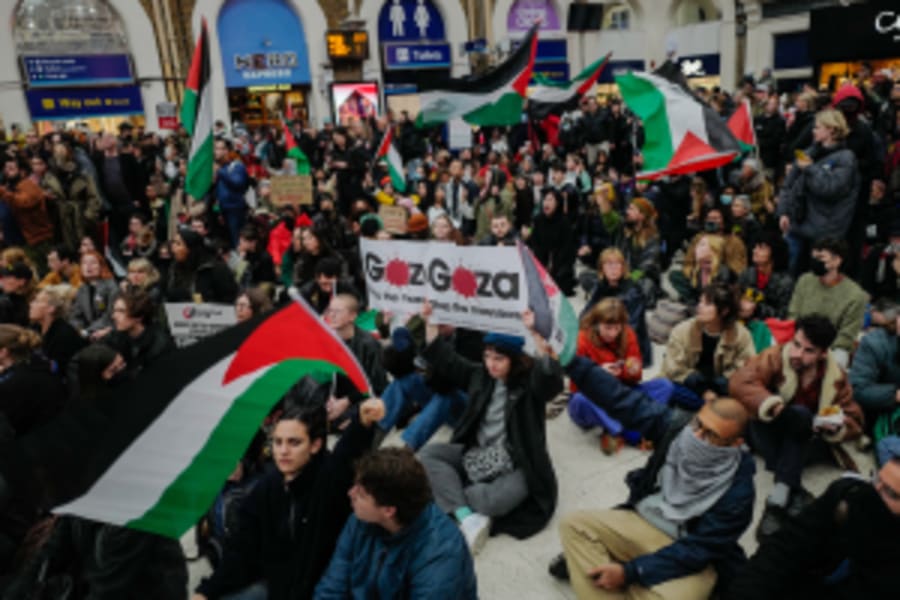Antisemitism 'was a tsunami. I think that October 7 just helped it erupt.'
INTERVIEW with Isaac Zafarti – StandWithUs – UK

The dawn of the new millennium ushered in two parallel game-changers for Israel. Firstly, Arafat and the Palestine Liberation Organization (PLO) launched their Second Intifada in September of 2000; secondly, social media was just taking off, providing the terrorists the perfect platform to exploit the mass media, to their advantage. In response, ‘Stand With Us’ was born.
Isaac Zafarti, executive director of Stand With Us UK, spoke to Paul Calvert of Bethlehem Voice Radio.
In 2002, as the Intifada continued to rage – marked by terrible suicide bombings throughout Israel – the brains behind this new internet-based initiative “realized that we need to create a combative tool that will present mainly the youth, the truth and the history about Israel,” explained Zafarti.
“The idea was to create a platform that will educate and work on campuses and bring the truth about Israel.” The first goal was to help students to “build their Israeli, Jewish, Zionist identity,” but also to give them the confidence to communicate this to their friends.
Twenty-two years later, Stand With Us is an international organization with offices around the world. The mood on campus today is similar to that of 2002-3, when Jewish Diaspora students (and other segments of the Jewish communities) experienced unpleasant, antisemitic reprisals, as Israel tried to defend itself against an already well-oiled Islamist terror machine. Today, if anything, campus life is potentially more dangerous, partly due to a sharp rise in immigration over the past 20 years.
“I would say that it might be dangerous,” explained Zafarti regarding the British situation. “If you will do two things: reveal yourself [as Jewish] and identify with Israel. [Then] yes, unfortunately, it is dangerous.” Zafarti qualified that a person who both hides their Jewish identity, and refrains from actively supporting Israel, is likely to be much safer.
Zafarti is himself a Sabra (Israeli-born) but has been living in the United Kingdom for two and a half years, which he calls “pivotal years.” The former special forces naval officer arrived in London just after the Israeli Gaza campaign, ‘Operation Guardian of the Walls,’ in 2021. The short campaign was launched in response to a deadly barrage of thousands of Hamas rockets fired towards Israeli towns and cities, including Jerusalem and Tel Aviv.
“And I saw the escalation,” said the Middle Eastern Jew, upon landing in the supposed peacefulness of the apparently tolerant capital city, that is loved by Israelis, and in which many live.
“So when I saw that Jewish schools were closed two weeks after October 7, under concerns that there might be security issues, and when I saw that some members of the Jewish community took off their mezuzah (Jewish prayer scroll) from their doors, I was not surprised at all, because it was a wave,” revealed Zafarti.
“It was a tsunami. I think that October 7 just helped it erupt.”
Sadly, the Stand With Us team saw the rise in antisemitism coming. “So no, I’m not surprised at all,” replied Zafarti, about the present situation, with mass anti-Israel sentiment being expressed on the streets of major UK cities, as well as in academic institutions. “And I’m not that optimistic about the future. I think that without strong involvement of the government, of the police and the society as a whole, the situation will get much worse.”
Regarding UK campus life in particular, Zafarti said that he can identify two major changes. The first followed immediately after Operation Guardian of the Walls, “when we saw a major shift in the atmosphere, in violence, in the way that the pro-Palestinian protesters were trying to challenge pro-Israeli, Jewish students on campus”.
The second change came straight after Oct. 7.
“You know, I personally, and my staff, we thought that it will take some time before they will go out to the streets and to protest on campuses,” he admitted. “And we were very surprised to see that, like, hours after the massacre, they didn’t even think to try to distance themselves from what happened. They had supportive rallies [for] what happened. They didn’t even treat it as something wrong. They thought that this is part of like normal resistance…
“I’m not talking about marginal campuses; I’m talking about the main campuses. And maybe the latest is what happened to our students [recently] in Leeds University. They put a table with some leaflets and educational content about Israel, put the Israeli flag and invited people to discuss. And a short moment after, a few students came and just flipped the table, took everything that the students [put out], assaulted them and went away. That’s the reality that we are facing right now.”
Asked whether university leadership is dealing with this issue of racism against Jewish students, Zafarti replied that the British academic scene is a “very complicated arena.”
“First of all,” he continued, “the university leadership, in my view, they can do a lot more. They realize that those anti-Israeli groups are very extreme. They don’t want to deal with them. I think that at the beginning they thought that if they will contain their messages, the situation might calm down. But I think that the opposite happened. As long as you feed the beast, it will become hungrier.
“And today I think that [the student leadership] completely lost control of what’s going on... So again, they also understand that they have a lot to lose, if they will try to challenge those extreme groups.”
Zafarti clarified that the people on campuses who sympathize – or even strongly campaign for – the Palestinian cause, have a lot of people behind them. “I don’t want to say that the Jews are the minority, but, you know, if you will go to a normal campus and see a rally, we’re talking about a massive amount of people and they are part of societies and other campus bodies.”
Even the neutral societies on campus, he explained, such as a Music Society, will “think twice” before they collaborate with the Israeli or Jewish Society, due to peer pressure. “They might find themselves boycotted by all the other societies that are afraid… of dealing with the Pro-Palestinian Society.”
On a more senior level, something that is not new is the politicization of the Student Unions, and the umbrella body, the National Union of Students, which has been known to pass anti-Israel resolutions.
“More and more student union bodies are led by pro-Palestinian students,” Zafarti said. “[They are] using the student union as a political platform to deliver their pro-Palestinian messages, but mainly anti-Zionist messages. I can give you examples [showing] even some of them using their official email signature, in a body that should represent all students, regardless of their views or origin or nationality. They’re using email signatures to put pro-Palestinian slogans, anti-Zionist slogans, etc.
“So right now, you have some, who I define as heroes, students that are taking the initiative and trying to change reality. But this is a drop in the ocean.”
Although discourse and debate are – and should be – a feature of university life, Zafarti explained that the nature of the pro-Palestinian camp is mainly one of narrative, as opposed to fact.
“I don’t think that facts are something that they care about,” he said. “I think that they have a narrative and they are following their narrative, and it is very hard to challenge the narrative with facts, because for them, if you will try to engage with them and discuss with them about facts and history, they will immediately cut you off and say, ‘Look, I’m not going even to discuss with you; you’re dangerous.’ [And] some other complements you [will] probably get… So it’s very rare to find people who are actually willing to argue or to discuss on a factual basis.”
Zafarti cited an example from University College London, a campus in the heart of London.
“We brought a speaker to speak [to around] 50 students, a year ago. Those pro-Palestinian groups heard about it and they organized 300 protesters, with smoke grenades, flags, obviously covering their faces with keffiyeh (traditional Arab scarf), chanting, and basically blocked the entrance to the building. So we [couldn’t] even bring the speaker to speak with the students. We were forced to hire security guards who came through an old parking lot, just to enter the building.
“It was a whole issue, just to ensure something that is so fundamental and basic on campus life, which is freedom of speech and freedom of ideas.”
Through collaboration with other organizations, such as UK Lawyers for Israel, Stand With Us UK is supporting students, whether individually or as part of a society. Support ranges from educational content, help with organizing events, with funding, or with legal advice and backing for the Jewish young person or group to understand, and fight for, their rights.
The British educational charity also provides opportunities, through its international Emerson Fellowship program, for students to meet with hundreds of others from around the world. “We are trying to identify the potential leaders on campus,” Zafarti explained.
“We are creating a very quality cohort of students, teaching them not only the facts and the history but also giving them public diplomacy skills, public speaking skills. They are meeting with ambassadors, journalists, so we’re really trying to open them to the world.”
Stand With Us UK also works with schools, providing workshops. They also have a group for Young Professionals, called the ‘Blue and White Club’. Many more have joined since Oct. 7, Zafarti pointed out. He said the organization is also a “one-stop shop for education and advocacy for Israel.” This means reaching all age groups, including more senior leadership, especially at this time.
Zarfarti has a positive take on the fact that pro-Palestinian slogans are becoming more explicit, such as the words ‘From the River to the Sea’ projected on London’s Big Ben.
“I think that those steps are helping maybe the British public to understand what they’re facing because every week it escalates more and more and more,” he said. “And what you saw on Big Ben, it’s just the tip of the iceberg. You see Fatah flags all over London, hanging on the streets as if it’s the national flag of the UK. They are putting those flags and other slogans on memorial sites for British soldiers."
“And I think that, on the contrary, those kinds of actions are maybe functioning as a wakeup call to the British people, that what we see on the streets against Israel, that it’s much wider than that. It develops as a war between two civilizations – and Israel, or the war in Gaza – is just an excuse to push this agenda all over the UK."
“So I hope that we won’t see more escalation, and people around the UK will understand that protests against Israel, and thousands and tens of thousands of people who supported a massacre of innocent people, this is not something that any free society can allow itself…”
Calvert asked whether advocates are seeing the Christian community stand with Israel at this time.
“Oh, 100%,” Zafarti replied. “We have fantastic collaboration with the Christian community here in the UK. They are reaching out to us. We are helping them with materials, with speakers. We are sometimes having joint events and, you know, it’s heart-warming to see the support that we are getting.” He added with a laugh that “sometimes we feel we are not doing enough when they are pushing us to do more.”
Regarding the public in general, Zafarti has also witnessed solidarity. He described an initiative of Stand With Us UK, in the first months of the war last year. They created Magen David (Star of David) badges but without their logo. They simply read, “I stand with Israel”. Zafarti said he was visiting family in the north of the UK, and he spotted strangers on the streets wearing these same badges. “And I knew,” he said. “I knew for sure that they were not Jewish people. They were not Jewish. People understand that there’s a right and wrong here.
“Obviously, it’s not an easy thing to be on the side of Israel and on the side of Western values and what we believe and democracy. As much as it sounds odd these days, yes, it’s a challenging thing. But I think more and more people understand who is in the right and who are in the wrong side here. And I hope that this trend will continue.”
Zafarti thanked Calvert for asking about his own, personal prayer for Israel at this time.
“I think that I’m wishing Israel to be united,” he replied. “And, you know, when we are working together, when we are united, nobody can defeat us. So now we are experiencing tough times and we experienced tough times in the past. All of our history is full of challenging times, and we prevailed. And this is another challenge of our generation. And if we will stick together and believe in our cause, we will win again.”
Click below to listen to the full interview.

The All Israel News Staff is a team of journalists in Israel.
You might also like to read this:


















